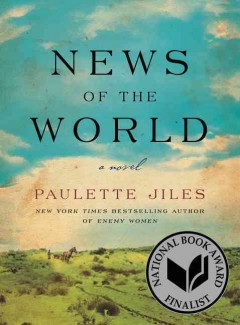Our usual meeting place was in use, so we met on our concert hall stage to discuss News of the World by Paulette Jiles. A painted black wooden floor, a table made of four smaller tables surrounded by sixteen chairs, a single bulb on a stand, centered at the edge of the stage, both a lure and a warning! The air seemed foggy, the overhead light filtering down to us unevenly, the back and edges of the stage in relative darkness. A grand piano, heavy curtains, and 250 empty seats. In retrospect, it helps me imagine Captain Kidd setting up to read in strange venues, lit by lanterns, collecting dimes and performing. The news of the world he read was as fantastical to many of his audience as this story seemed to us today, depicting a post-Civil War Texas where handguns were illegal and abducted children wanted to stay with their captors.
Our first responder volunteered by email: “This is an incredible reminder of just how tough ordinary life was for our ancestors. I wish everyone who complains about their quality of life could read this book. I didn’t suspect it was based on a true story until the very end. My only criticism is that the title led me to think that this would be an ordinary novel about contemporary life. It needs a much more dramatic title. Can we put our heads together and come up with a better title? I’ll start the ball rolling. The Kiowa Maiden.” Later she added: “Return of the Kiowa Maiden.”
After some discussion, we decided against changing the title. Some of the appeal of the book was thinking about the news of the world, in the book and in today’s reality: immigration, political polarization, gun control.
We considered why the author wrote without using punctuation for dialogue – again with mixed results. Some of us hadn’t noticed it, some had been annoyed, mostly it didn’t seem to matter. One of us found the story predictable. Another was pleased to have a book that “moved.” It was refreshing, easy to read, informative, and with a happy ending. However, one of us wondered if Captain Kidd’s rescuing of Johanna in the end was a bit out of character. We seemed to feel that the author was reliable, but we did not delve in to many details. Discussing the publisher-provided questions, we did feel the author followed the arc of the hero’s journey, much like the story of Odysseus, with some of us championing Captain Kidd, some Johanna, and some for both. We felt that Johanna had benefited from her captivity, learning much needed life skills and then adapting to her return. One favorite scene was when Johanna used dimes for ammunition and then later charged forth, ready to scalp her attacker.
Our discussion bounced around considerably, including comparisons with previous book club selections Orphan Train, The Perfectionists, Mrs. Sherlock Holmes, and Dragon Teeth. One of us had read parts of Captured by Scott Zesch, the book Paulette Jiles recommended for further study. We came back repeatedly to the topic of why children would not want to return home, wondering about the appeal of the native lifestyle and religion, even to people today.We briefly discussed Stockholm syndrome and the Irish Potato Famine (An Gorta Mor)[i]
Although I’m fairly certain our club liked News of the World, it’s only an impression. An impression intensified by the birthday cake we shared before the discussion started and the good feeling of friendly, caring people surrounding me.
- Other Works discussed:
- Dragon Teeth (2017) by Michael Crichton
- Man’s Search for Meaning (1946) by Viktor Frankl
- “A Modest Proposal” (1729) by Jonathan Swift
- Mrs. Sherlock Holmes (2017) by Brad Ricca
- Orphan Train (2013) by Cristina Baker Kline
- The Perfectionists (2018) by Simon Winchester
- Book Circle recommendations:
- Historical fiction by Susan Wittig Albert
[i] The author says in her afterword that Doris best explains Johanna’s situation by comparing it to the Irish Potato Famine: “You can put her in any clothing and she remains as strange as she was before because she has been through two creations. . .”(pg 56).
